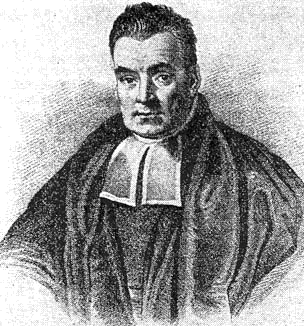 |
| The earliest known portrait of Thomas Bayes, which may not actually be of the originator of Bayes Theorem |
What does it mean to presume innocence? If you assume a priori that there is zero probability of guilt, then no amount of evidence would result in a probability of guilt above zero. Perhaps the base assumption is that all the members of the community have equal probability of the criminal behavior. So in a town with 1000 people, one might start out with the assumption that the accused had one chance in 1000 of being guilty, while in a city of a million inhabitants that a priori probability might be one in a million. Somehow that doesn't seem to get at the fairness we assume to be the basis of our judicial system; why should small town citizens be treated as more probably guilty than big city ones? Moreover, we know that men, and especially young men are more likely to commit crimes than women, and old women are especially unlikely criminals.
What probability of guilt corresponds to "beyond a reasonable doubt"? What odds would you want to get to bet that the accused was guilty? An even bet seems clearly to imply a reasonable doubt. How about 2 to 1? 3 to 1? 5 to 1? 10 to 1? Does "reasonable" depend on the characteristics of the accused? Would you want a young person whose life might be ruined by conviction of a major crime to be more clearly guilty than an older person accused of a minor crime?
How good are jurors in assessing the weight of evidence? Eye witness testimony seems to be convincing, but we know that eye witnesses are often wrong. How often? We also know that some people are face blind, and their eye witness testimony seems less credible than that of other people. How about the circumstances of the identification -- how long between the crime and the identification, and the role of the police with the witness. Those are things that we expect a defense attorney to bring out in confrontation with the witness.
Expert testimony seems similarly difficult for jurors to properly evaluate in probabilistic terms. We know that there have been problems with fingerprints, and that jurors (perhaps influenced by popular fiction) tend to believe all fingerprint evidence is equally credible and strong, while in fact much is flawed. Polygraph data was once believed a gold standard, and is now banned, yet it too could provide some information to the jury if properly interpreted.
I got to thinking about this in terms of DNA evidence. It is one of the few kinds of evidence that can strongly incriminate a person on the basis of physical evidence obtained from the scene of a crime. Experts have testified that matching a large number of points in a genetic profile, each with several alternative possible values gives astronomical odds against false matches. On the other hand, having spent time debugging complex computer programs, I know that bugs can exist in even well vetted programs. Moreover, people make mistakes -- then send the wrong sample to the lab, they send the wrong results from the lab to the police. What is the chance that there are identical twins, the wrong one of which is the accused in court? Certainly less than one in a trillion which has been cited as the odds against a false match of modern DNA matching. Apparently our courts do not require that the attorney for the accused have the right to confront all the people involved in the chain of DNA evidence, so the jurors don't have full opportunity to assess probabilities.
And of course, we know that people are not good at betting, especially if they have not learned how to assess odds. They are especially poor at assessing odds for very likely or very unlikely events. People bet more on long shots at horse races than experts feel that they should, making it possible for expert punters to profit even after the track takes its cut from the parimutual pool.
We also know that a group of people making a joint decision is likely to do a better job than an individual. In the one time I served on a petit jury, the members took their responsibility seriously, and I thought did a good job. Maybe the jury system is the best we can do.
On the other hand, maybe schools should prepare people for doing a good job when serving as jurors. Understanding how to evaluate evidence and how to judge probabilities might help the students later in life, not only when serving on juries, but in business and as voters.
No comments:
Post a Comment